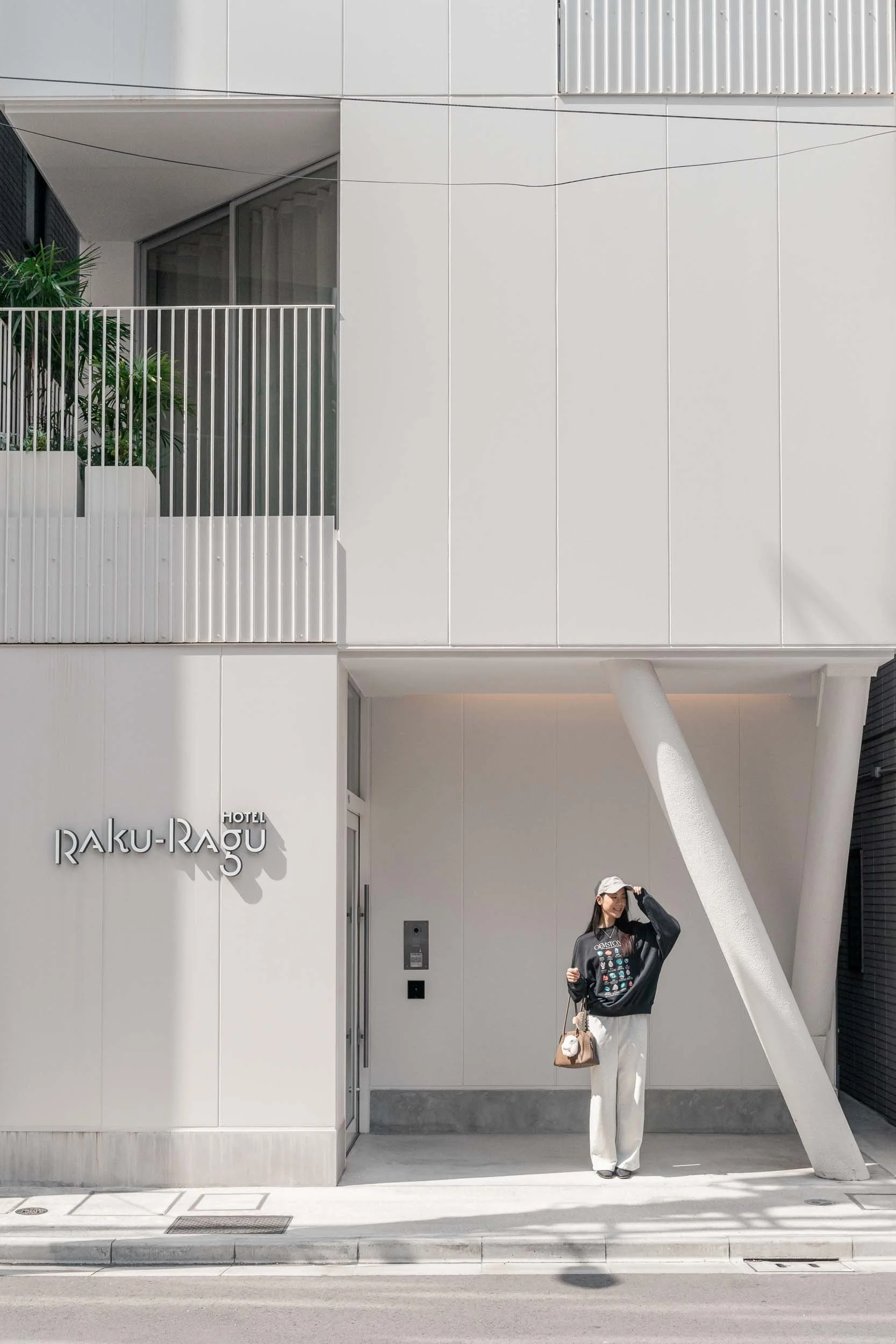Checking Into Hotel Rakuragu: The Award-Winning Design Hotel in Nihombashi
Tokyo has become a comfort destination over the years.
I am no stranger to Japanese hotel chains that cover all the basics, but they are often fairly predictable and rather cramped for space. Given that this was our third trip to Tokyo in twelve months, to mix things up, we opted for a boutique hotel in the Nihombashi district instead.
Stepping into Rakuragu was like entering a carefully crafted oasis of calm amid Tokyo’s energetic pulse. The hotel’s sleek white facade, punctuated by its signature tilted pillar, stands as a beacon of thoughtful design, and its refined minimalist vibe immediately sets it apart—clean lines, soft natural light, and an artful interplay of textures create a contemporary and warmly inviting space. It’s a place where design meets comfort without pretence, earning its global recognition among the world’s top hotels in 2024 by Dezeen and the prestigious 2025 iF Design Award.
Getting There
Nihombashi is historic and vibrant, off the beaten path, and often overlooked by Tokyo tourists. Situated just a few minutes on foot from both Mitsukoshimae Station (三越前駅) on the Ginza and Hanzamon lines and Ningyōchō Station (人形町駅) on the Asakusa and Hibiya lines, Rakuragu offers superb accessibility without the noise and chaos of a major thoroughfare. This location makes exploring Nihombashi’s blend of traditional shops, cutting-edge galleries, and jazzy nightlife a pleasure.
Guest Rooms
Inside, the guest rooms continue this narrative of calm sophistication. The narrow building meant only a maximum of two guest rooms on each floor, ensuring peace for a private stay. We stayed in the Standard Balcony Room, with a cosy balcony that was the perfect corner to sit back and savour a morning coffee in the quiet Nihombashi air.
The room was softly lit with a low platform bed nestled against a curved wooden headboard illuminated by a gentle, hidden LED glow. Sheer, floor-to-ceiling curtains diffused natural light perfectly, creating a restful and elegant space that felt like a personal sanctuary with subtle earth tones and smooth, sleek finishes.
The only downside to Japanese minimalism is that you lose out on practical guest room features like wall hooks to hang up and spray your coats as you return from smoky meals, spacious wall and cupboard shelving, or a long table to work on. But I can’t complain, because true to our expectations, foot space was ample, fitting two full-sized suitcases laid flat plus all our daily shopping hauls, with plenty of room to spare. Now that’s a first for me in Tokyo.
Design Concept
Beyond the rooms, the hotel’s public spaces embody a gallery-like calm. The lobby features a plush, velvet-toned sofa set against pristine white walls, inviting guests to linger over a magazine. The striking sculptural installation—a large, reflective disc encircling a pillar that brings to mind the whole note symbol—adds a touch of avant-garde artistry, reinforcing the hotel’s commitment to design as an experience.
It may not be immediately apparent to the eye, but Rakuragu’s concept ties back to roots in music with a subtle dedication to local culture. From detailed event information on Nihombashi’s jazz and artistic happenings to a beautifully designed 2025 calendar featuring images of the hotel’s signature décor elements, it’s clear that the property is deeply intertwined with its neighbourhood’s creative spirit. If you are down for a chill, slow-paced exploration of Tokyo’s less-touristy areas, Rakuragu offers a curated glimpse into the area’s cultural tapestry for a bespoke stay.
Thoughts
In some ways, Rakuragu reminds me of Port Hotel in Eastbourne. We wanted a boutique design hotel that wasn’t ridiculously priced, and it was exactly what we got. It nailed all the major aesthetics, but came with minor inconveniences that exposed the greenness of the property brand as a whole. Would I trade off the predictability of mainstream Japanese hotels (that had their sense of comfort) and classic facilities like public baths and laundry rooms for minimalistic spaciousness? Hard to say. What I can confirm, though, is that Rakuragu left me with a rare sense of balance that doesn’t feel like you were in downtown Tokyo. If you’re seeking a retreat that honours Nihombashi’s heritage and adds a modern pulse, Rakuragu is a beautifully crafted choice that promises a calm, stylish stay.
This post may contain affiliate links, meaning we receive a commission when you click and make a purchase.
Related Posts














